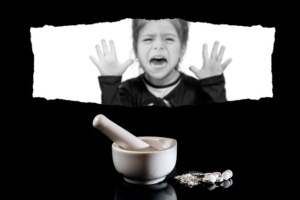The Mad in America Parent Resources Q&A section is a safe place to ask questions and share concerns about children, families, and alternatives to conventional psychiatric treatments and have them answered on site by one of our subject experts. Please email your questions to [email protected]. Your identity will be kept confidential. Questions may be edited for length and clarity. An archive of past Q & A’s can be found here.
Question:
I recently became the foster parent of a 10-year-old girl. She is on a cocktail of several medications that were prescribed to treat behavioral problems, according to her social worker. My daughter says she doesn’t like how the drugs make her feel and we both agree that they don’t really seem to help her. It seems she initially was prescribed stimulants for “ADHD” and then became aggressive, after which she was given SSRIs and antipsychotics to “calm her down,” even though hasn’t been diagnosed with depression or psychosis. Now she reports feeling weird, falling asleep in school, and having a hard time sitting in one place for any length of time.
What are the legal and ethical considerations involved with withdrawing her from the meds? What power do I have as a foster parent to influence this decision? (Her previous foster parent placed her on these drugs.)

Reply from Steve McCrea, M.S.
I worked for 20 years as an advocate in the foster care system, and I can tell you that, sadly, your experience is far from rare. Children with a history of trauma often have a negative reaction to the stimulants prescribed for “ADHD,” leading to increased irritability and/or aggressive behavior. These are known side effects of stimulants, but doctors seldom appear to notice the connection and will all too frequently diagnose the child with bipolar disorder, or even prescribe antipsychotic drugs without adding any further diagnoses.
Which is why foster parents such as you are so very important for foster youth! Foster parents have far more influence than most imagine in how these decisions are made. You may or may not have the formal authority to start or stop a particular drug regime, depending on the state in which you live. But you are the person who sees the child most and can provide the best real-time data on what kind of impact these drugs are having on your foster child.
First Option: Work with a Doctor
You stated that her previous foster parent “placed her on these drugs.” This suggests that in your state, foster parents may be delegated the authority to make these decisions in consultation with a physician. If this is the case, your task is much easier: You just need to find a pediatrician who will listen to your concerns and to your foster child’s experience and then support you in making the necessary changes. You might want to find other foster parents in your area who have similar beliefs and values and see if they can suggest supportive doctors who will help you do what is right for your child.
Increasingly, however, states are unwilling to delegate this power to foster parents. While most foster parents work hard to do what is best for their charges, some have been willing to “shop around” for doctors who will diagnose their child with a mental illness and provide them with psychotropic drug prescriptions. Unfortunately, most states provide extra funds for foster parents of “difficult children,” and getting a child a psychiatric diagnosis often results in an increase in the foster parents’ reimbursement, providing an inadvertent financial incentive to get a foster child both diagnosed and medicated.
Get the Caseworker on Board
If you live in a state that doesn’t allow foster parents to make decisions about psychotropic drugs, your job is to get the caseworker on board with your observations and priorities. Too often, caseworkers will make plans for the child without realizing she is taking psychotropic drugs. Or, drugs will be prescribed without any communication with the caseworkers about that child’s current stressors or treatment plans. So you have an important role to play in educating them. A few things can help with this task:
- Keep a log of behavior and observations of the child, including comments she makes about the drugs and how she’s feeling. Write them down with the date and time in a straightforward way. This kind of evidence can be critical in winning someone over to your views. Be very specific in your observations: “Her hand seems to constantly be trembling, and she spends a lot of time trying to stop it. She reports being nauseated at mealtime. Her teacher reported her falling asleep in class two times last week, and says she still has lots of trouble completing her schoolwork despite the drugs.” This kind of factual reporting is the best way to make sure you appear objective and are not dismissed.
- See if you can get the doctor on your side by showing him/her the logs and letting the doctor know why you feel the drugs are not appropriate for this child, as well as what alternative interventions you would suggest when the drugs are discontinued. If you and the doctor agree on a course of action, it’s very likely that everyone else will go along with the plan.
- Open any conversation with a caseworker or mental health professional with a respectful acknowledgment: Let them know you appreciate their work and experience, and that you know they want to do what’s right for your child before bringing up the concerns you have about the current plan. It is also very helpful to use the term “we” when talking about what has happened, so it doesn’t appear you are blaming anyone else.
- Express your concerns as just that, “concerns.” Badmouthing or criticizing prior foster parents, the mental health professionals, or doctors is counterproductive. The focus should be on addressing the distress that your foster daughter is expressing or experiencing. Use your log of observations to clarify these concerns.
Explore Legal Options
I generally advise starting off by trying to win people over with good relationships, compassion, and logic. If more collaborative approaches have not been successful, it may be time to move to higher conflict tactics.
- In most states, children in foster care are required to have attorneys. If your child has one, engage the attorney first and get them on your side. The attorney’s job is to advocate for the child’s stated wishes, so he or she is the most likely person to support the child’s position and needs.
- If your child does not have a Court Appointed Special Advocate (CASA) or Guardian ad Litem (GAL), consider asking for one to be appointed, especially if the caseworker is known not to be open to suggestion, or if initial conversations don’t go well. The CASA/GAL is charged with advocating for the child’s needs, so again, they are likely to be allies if you find resistance to your efforts. If the child already has a CASA/GAL, by all means, engage them early in the conversation and make sure they talk to your foster daughter about her feelings and concerns. The CASA can also help inform you in lay terms of the options available to advocate for this kind of change.
- If necessary, don’t be afraid to go to court and talk to the judge. Most states have laws that allow judges to at least order a second opinion if a child’s needs are not being met by the current treatment plan, and some states even allow judges to order medications to be discontinued.
- Work with the attorney and/or CASA/GAL to arrange to have your foster child talk to the judge directly in chambers about her experience. A child of 10 is in most cases quite capable of letting the judge know what her concerns are and what she wants to happen. Most judges will allow it, with the agreement of all the attorneys, and usually find this kind of information quite helpful.
Discontinuing Drugs: What to Expect
If you do manage to get the team on board with discontinuing the drugs, do so very carefully. Every case is different and needs to be approached individually, but the general idea is that you should move slowly, tapering down one drug at a time. It is possible that starting with the first drug to cause negative side effects (in this case the stimulants) may be the place to begin. A supportive doctor’s assistance is essential at every step. It is very important to understand that withdrawing from psychiatric drugs frequently leads to a temporary increase in “symptoms.” This can lead the professionals involved to panic and give up on the plan because they regard the child as “relapsing.”
Equally important, foster children often exhibit behavioral or emotional “symptoms” that are completely normal, or at least understandable for a child in her situation. We should all appreciate that depression, anxiety, difficulty prioritizing schoolwork, anger, and even aggressive behavior are common reactions to past and ongoing trauma these children have experienced. It is unreasonable to expect foster children to behave as if nothing has happened to them. They have been abused or neglected, then forcibly removed from their homes, neighborhoods, schools, families, and communities and placed in someone else’s home without anyone asking them what they think about it. They need our help and support, but diagnoses and drugs often serve to invalidate their suffering and leave them feeling abnormal and to blame for their families’ problems.
Foster parents like you are vitally important in communicating the needs, feelings, and experiences of the foster children in your care to those who have such power to disrupt or improve their lives. Please continue to do whatever you can to make sure people are listening to her and her needs.
 Steve McCrea, MS, is a mental health professional, advocate and author who has worked for over 30 years in social services, including over 10 years as a mental health professional. He currently works as an advocate for foster children. He is a member of Portland Rethinking Psychiatry, an educational and advocacy group inspired by the works of Robert Whitaker.
Steve McCrea, MS, is a mental health professional, advocate and author who has worked for over 30 years in social services, including over 10 years as a mental health professional. He currently works as an advocate for foster children. He is a member of Portland Rethinking Psychiatry, an educational and advocacy group inspired by the works of Robert Whitaker.















Thanks for the article Steve.
Really disturbing to me. Not your fault; but the subject matter.
Report comment
Yeah, sorry about that. For anyone who knows what foster care is like, it’s pretty grim reading, isn’t it?
Report comment
Not in foster care thank goodness. Makes me angry to read about this after the crap psychiatry has put me through since age 18. Hard enough as an adult.
If I ever have the financial means I want to take in foster kids. That’s why I’m reading this. 🙂
Report comment